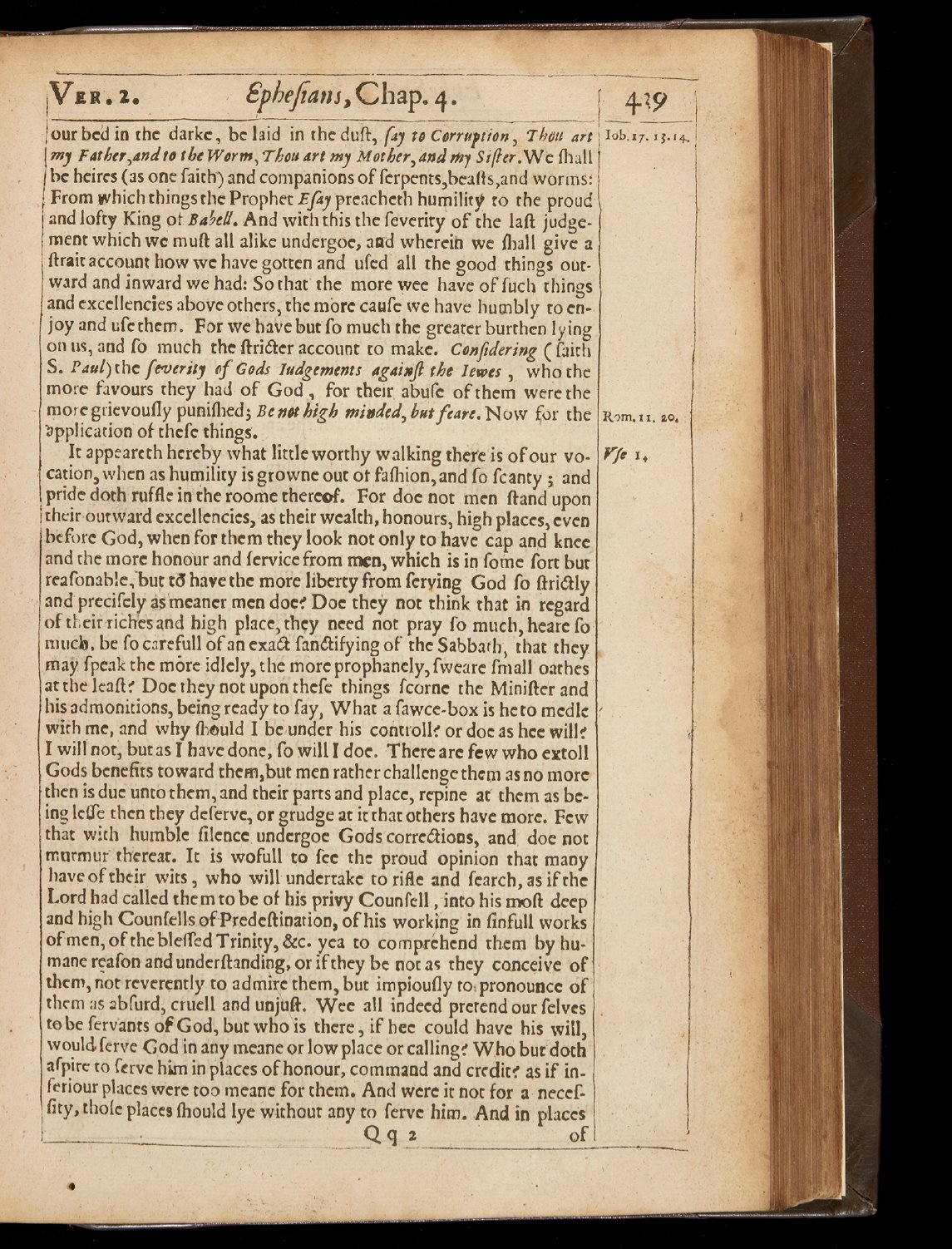

VER, z.
ephefians,
Chap.
4.
4-19
:our
bed
in
the
darks,
be
laid
in
the
duff,
fay to
Corruption, 7boo
art
16.17.
s'4.
Imy
Father,and
to
tbeWorm,Thou
art
my
Mother, and
my
Si
fter,We
(hall
he
heires (as
one
faith)
and
companions
of
ferpents,healls,and
worms:
From which things the Prophet
Eft',
preacheth
humility to
the
proud
and
lofty
King
ot
And
with
this the
feverity
of
the
Taft
judge-
ment
which
we mutt all alike undergoe,
and
wherein
we {hall
give
a
(trait
account
how we
have
gotten
and
ufcd
all the
good things out-
ward
and
inward
we
had: So
that
the more
wee have
of
tech
things
and
excellencies above others, the
more
caufe we have
humbly to
en-
joy
and ufe
them. For we
have
but
fo
much the greater burthen
lying
on
us, and
fo
much the
ftriéter
account
to
make.
Confidering
(faith
S.
Pad)
the
feverity
of
Gods
Judgements
againfl the
Lewes
,
who
the
more
favours they
had
of
God
,
for
their
abufe
of
them were the
moregricvoufly
puni(hed;
Bermhigh
minded, but
flare.
Now
for
the
Rom.,,,
so,
-application
of
thefe things.
It
appearech
hereby
what
little worthy
walking
there
is
of
our vo-
Y/e
s.
cation, when
as
humility
is
growne out
ot
fafhion,
and
fo fcanty
;
and
pride
doth ruffle
in
the
roome thereof.
For
doe
not
men
(land upon
their
outward
excellencies,
as
their
wealth, honours, high
places,
even
before
God,
whenfor
them they look not only to
have cap
and knee
and
the
more honour
and
fervice
from
men,
which
is
in tome
fort
but
reafonable,
but td
have
the more
liberty from
ferying God
fo
flriétly
and
precifely
as
meaner men
doe?
Doe they not think that
in regard
of
their
riches and
high
place,
they
need
not pray
fo
much,
heare
fo
much,
be
fo carefull
of
an
exai
l
fandifying
of
the Sabbath,
that they
may fpeak the mère
idlely,the
more prophanely, fweare
fmall
oathes
at the
kalif
Doc
they not
upon thefe
things fcorne
the
Minifter
and
his
admonitions, being ready
to
fay,
What
a
fawce
-box
is
hero
medic
with
me,
and
why
(
hould
I
be under his
control!?
or
doe
as
hee
will?
I
will
nor, but
as
I
have
done,
fo
will
I
doe.
There
are
few who extol!
Gods benefits
toward thern,but
men
rather
challenge them
as
no
more
then
is
due
unto them,
and
their
parts and place, repine
at
them
as
be-
ing leffe then
they
deferve,
or
grudge
at
it
that
others havemore. Few
that
with
humble filence
undergoe
Gods
corrcfìions,
and
doe
not
murmur
thereat.
It
is
wofull to
fee
the proud
opinion that
many
have
of
their
wits,
who
will
undertake
to rifle
and
fearch,
as
if
the
Lord
had
called
them
to
be
of
his
privy Counfell
,
into
his
croft
deep
and
high Counfells
ofPredeftination,
of
his
working
in
finfull
works
of
men,
of
theblelfed
Trinity,
&c.
yea
to
comprehend them
by
hu-
mane
reafon
and
underftanding,
or
if
they
be
not
as
they
conceive
of
them,
not
reverently
to
admire them, but
impioufly
to pronounce
of
them
as
abfurd, cruen
and
unjuft. Wee all
indeed pretend our felves
to
be
fervants
of
God, but who
is
there,
if
hee
could
have his
will,
would
ferve
Cod
in any meane
or
low
place
or
calling?
Who
but
doth
afpire
to
ferve
him
in
places
of
honour, command
and
credit?
as
if
in-
fenour
places
were
too
meane
for
thetn. And
were
it
not
for
a
necef-
fity,
thole
places
fhould lye
without
any
to
ferve
him. And
in
places
Q
9
2
of

















